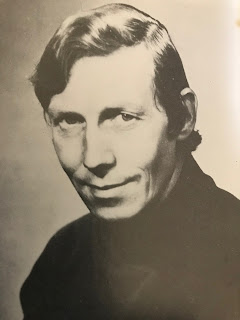Reginald Hill was an admirer of Martin Russell's crime fiction, and for the first two editions of that magisterial tome Twentieth Century Crime and Mystery Writers, he contributed an essay about Russell's work (I took over this pleasurable task for the third and fourth editions). In that piece, he highlighted Mr T, published in 1977, as one of Russell's cleverest stories.
I'd agree with this verdict and it's significant that Harry Keating chose this book as one of the titles reprinted to celebrate the Diamond Jubilee of Collins Crime Club in 1990. The puzzle is ingenious and unusual (although I should say that I recognised one key plot device from another Russell novel, almost equally tricky, but the stories are really very different in other ways). The set-up is one that Cornell Woolrich would have loved, but the resolution is rather more carefully put together than is the case in many of Woolrich's stories. Woolrich was in some ways a superior writer to Russell, and he certainly had greater pretensions as a prose stylist. I'm a Woolrich fan, but I do think Russell is under-rated.
John Tiverton arrives home from work to find that his own wife doesn't recognise him. Nor does a neighbour called Elkins. The police are called and he's thrown out of the house. People at work don't recognise him, either. He's told that John Tiverton was killed in a car crash six months ago. In a phone call, his mother confirms this.
He's a metallurgist who has been working on a secret project and has been carefully vetted by the security services. As he tries to put the pieces of his shattered life together, we make assumptions about what has been going on. But Russell has kept several things up his sleeve. This is an intriguing story and, despite tricky and far-fetched elements in the narration of events, it deserves to be better knonw.





![The Finisher (Peter Diamond Mystery) by [Peter Lovesey]](https://m.media-amazon.com/images/I/51+qXqKB4vL.jpg)










